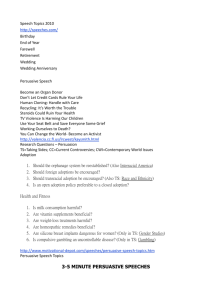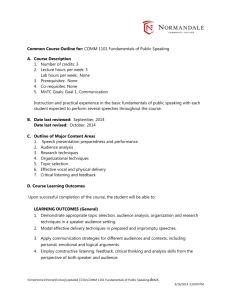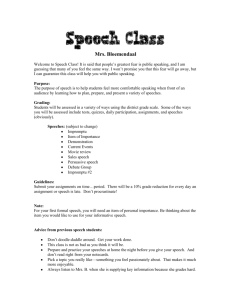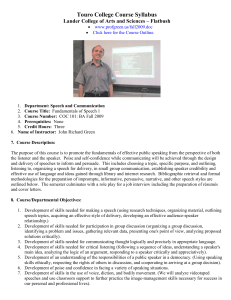File
advertisement
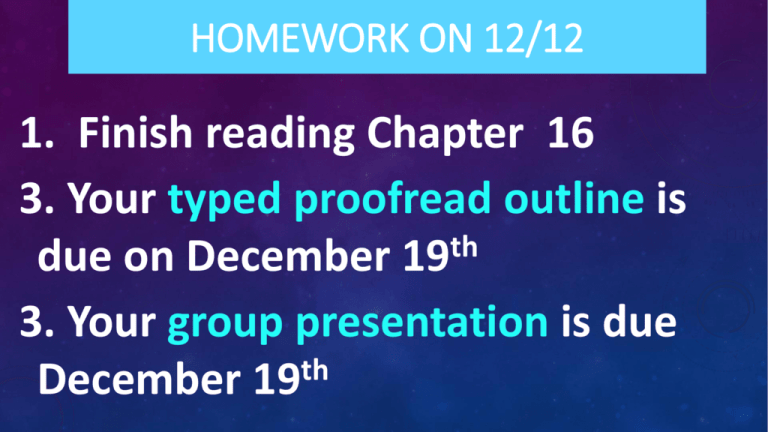
HOMEWORK ON 12/12 1. Finish reading Chapter 16 3. Your typed proofread outline is th due on December 19 3. Your group presentation is due th December 19 LESSON 12 WEEK 13 CHAPTERS 5 & 6 PUBLIC SPEAKING PROF.: MS. K. CASIMIR 12/9/14 OBJECTIVE: • Today, we will review the five types of speeches for special occasions. Then, we will go into speeches for competition: such as debates, the prepared speech , the impromptu speech, questions and answers and what to do in each one. Furthermore, we will go over what will be expected for your final self analysis and final persuasive speech delivery. Finally, each team will present their group presentation for 5 minutes each. PERSUASIVE SPEECH: Sample Speech with Commentary “Making a Difference Through Special Olympic” CD #14.4 Page 217 LESSON 15 WEEK 15 CHAPTERS 15 AND 16 PUBLIC SPEAKING PROF.: MS. K. CASIMIR 12/9/14 SPEECHES FOR SPECIAL OCCASIONS 4 Types SPEECHES OF INTRODUCTION • Is a speech that introduces the main speaker to the audience, by building enthusiasm and a welcoming climate among the audience SPEECH ON INTRODUCTION…. • Be brief • Make sure your comments are accurate • Try to create a sense of excitement and be creative, sincere and dramatic! • Make sure you adapt your remarks for the occasion, speaker and the audience • Be sure to use the extemporaneous method (page 223-24) SPEECHES OF PRESENTATION • Is a speech that give or presents someone a gift, an award, other forms of public recognition. SPEECHES OF PRESENTATION …. • Be brief • No more than 5 minutes in length • Tell the audience why this person is receiving this award. • Tell them the specific contribution / achievements why this person is receiving this metal or award. (page 226) SPEECHES OF ACCEPTANCE •Is a speech that gives thanks for a gift or award or some other forms of public recognition. (page 227) SPEECHES OF ACCEPTANCE… •Always followed the speeches of presentation •Must be focused, brief, with humility and graciousness. (P.227) TOASTS •Is a speech of greeting, celebration or thanks, usually in combination with a meal or reception for a specific event WEDDING, FOR EXAMPLE TOASTS… • Be brief, no more than three-5 minutes, with a few sentences of welcome wishes for good health/joyful marriage or career • Toast are capped off and glasses are raised up • Say “ Cheers” “Gan Bei” “Here’s to good health” • Must be sincere filled with graciousness and warmth • Be mindful of the occasion –may need to say something related to the occasion, meeting or negotiation (p 228) COMMEMORATIVE SPEECHES • Is a speech that pays tribute to a person a group pf people or an institution or an idea. • To pay tribute is to give honor, worth, praise , inspire or celebration. • The speech made during the National Day or 4th of july COMMEMORATIVE SPEECH… Example: “My Crazy Aunt Sue” Pages 230-31 SAMPLE SPEECHES “The Nobel peace prize award” MRS. B BUSH Choices and Change A Commencement Address at Wellesley College. June 1990 (Appendix 7) VIDEO SAMPLE: Evaluate the use of the persuasive speech method: Video 14:5 “Teenage Driving” HOMEWORK ON 12/12/14 1. The Project on 12/19/14 2. Outline is Due on 12/19/14 2. Finish reading Chapters 16 LESSON 15 WEEK 15 CHAPTERS 16 PUBLIC SPEAKING PROF.: MS. K. CASIMIR 12/11/14 PART OF YOUR FINAL EXAM Will be an impromptu Speech THINGS YOU MUST BECOME AWARE OF: • Your English level competency: vocabulary and pronunciation and articulation • Know your two audiences: the judges and the people who are there listening to you. • How well you are prepared intellectually and emotionally- read widely and be relax! SPEAKING IN COMPETITION: •Speaking as communication: involves 4 types: •Prepared speech •Impromptu speech •Question and answer session •Debate PREPARED SPEECH • Prepared way in advance • Be aware of your time limit and stay within that boundary • Your introduction should get the audience involved should be vivid, clear and appropriate. • Make sure you have limited number of main points but high quality of evidences. Should flow smoothly and naturally. • You deliver this speech without notes or manuscript with appropriate facial expression eye contact and natural, spontaneous gestures! CREATIVITY • Be creative • Be yourself • Develop your own style • Be mindful of the language you use: imagery and rhythm • Your goal is to create that brilliant spark that stands out in your speech CREATIVITY: •Macro creativity •Micro creativity THERE ARE TWO TYPES OF CREATIVITY •Macro creativity-how you organize the whole speech from the beginning till the end. (This involves the language , the organization, and content and delivery of your speech) MICRO-CREATIVITY: • Micro creativity-is creativity in one section of your speech that stands out. • It is the one thing that stands(that brilliant spark) out from the rest of your speech. (This might be a clever example, quote, a memorable phrase, or poignant emotional appeal that captures the audience’s imagination) SAMPLE SPEECH “ New Beijing: The Three – Colored Olympics” Read Page 238-239 THE IMPROMPTU SPEECH • Usually follows an impromptu speech • you are given little time to prepare from 15 seoconds-20 minutes. • Usually 1-2 minutes in length. • Although difficult, it is a good preparation for your professional life and daily events MUST BE OR HAVE: • Be precise • Clear organization • Stay away from word fillers/ repetitions/ pauses • Use signpost to identify each new points. During delivery: Be calm, relaxed and self assured no matter how nervous you are. • Maintain good eye contact • Practice different topic and record yourself: check your organization, fluency. Pronunciation, articulation, clarity, eye contact and gestures. THE IMPROMPTU SPEECH Must have an: Intro: Go straight to the thesis statement Body: can have one or two main points. No more than three points. supported with enough statistics, examples and testimonies(Use your own experiences). Conclusion: Wrap up quickly and thank the audience for listening HOW TO BEST PREPARE YOURSELF? • Develop a desire for knowledge • Read widely! • Listen to all kinds of international news to inform yourself • Begin to develop an interest in educating yourself in all aspect of life: culture, history, geography, arts ect.. • Hang out with people who are different then you and ask lots of questions. IMPROMPTU TOPIC Which is happier, To love or to be loved? 2 mins. SAMPLE SPEECH: “ We should not Rebuild the Old Summer Palace” Page 242-43 QUESTION AND ANSWER SESSION • Usually follows a prepared speech • your goal is to anticipate and try to practice answering these questions before the competition. • When you practice yours speech, ask your listeners to ask you questions as well • Practice answering them as well • Listen carefully, if you don’t understand, ask the speaker to kindly repeat or give an example of what he or she meant. • Try to answer each questions fully EXAMPLES: Page 245-246 DEBATE •You must defend your position •You must be quick and persuasive using the right strategy and techniques DEBATE: USING REASONING •Reasoning from specific instance •Reasoning from principle •Reasoning from causal reasoning •Analogical reasoning Chapter 14 & page 247 DEBATE: THE KEY IS TO • Prepare: Educate yourself, listen other good speakers, Ask for thought probing questions • Practice: recoding yourself, pay attention to your pitch, volume an speed and your method of argument and delivery. DEBATE: THE KEY IS TO • Pay attention to the method of argument used by your opponent and try to spot weaknesses and use that for your gain. Exposed weakness • Be respectful to one another. Do not attack the person-deal only with the topic. HOMEWORK: • Practice your speech • You must give your speech from a speech outline or from a simplified note card. • Record your voice and check to see what needs to be corrected. • Make sure you are prepared to ask

